

Triangulation in Educational Research. Triangulation in Educational Research What - Triangulation is the application and combination of several research methodologies in the study of the same phenomenon.
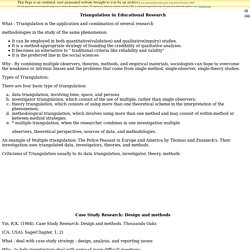
It can be employed in both quantitative(validation) and qualitative(inquiry) studies.It is a method-appropriate strategy of founding the credibility of qualitative analyses.It becomes an alternative to " traditional criteria like reliability and validity"It is the preferred line in the social sciences Why - By combining multiple observers, theories, methods, and empirical materials, sociologists can hope to overcome the weakness or intrinsic biases and the problems that come from single method, single-observer, single-theory studies.
Action research: a contradiction in terms? There are diverse types of action research, varying across several dimensions: in whether carried out by practitioners or external agents; in how individualistically or collectivistically they are pursued; in whether they are concerned with local and specific problems or with bringing about wider educational or social change; in which methods they favour; in what methodological or theoretical stances they draw on, for instance positivism, post-positivism, critical theory, or postmodernism(1).
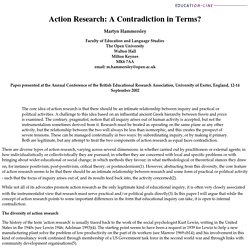
Overview of Action Research Methodology. “If you want it done right, you may as well do it yourself.”
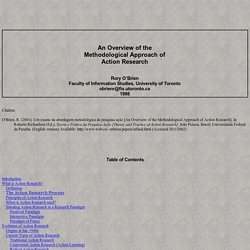
This aphorism may seem appropriate if you are a picky housekeeper, but more and more people are beginning to realize it can also apply to large corporations, community development projects, and even national governments. Such entities exist increasingly in an interdependent world, and are relying on Action Research as a means of coming to grips with their constantly changing and turbulent environments. This paper will answer the question “What is Action Research?” , giving an overview of its processes and principles, stating when it is appropriate to use, and situating it within a praxis research paradigm. The evolution of the approach will be described, including the various kinds of action research being used today. Definition. AR-Guide-final.pdf. Data collection methods. Qualitative and Quantitative Methods Data are usually collected through qualitative and quantitative methods.1 Qualitative approaches aim to address the ‘how’ and ‘why’ of a program and tend to use unstructured methods of data collection to fully explore the topic.
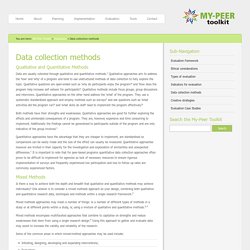
Qualitative questions are open-ended such as ‘why do participants enjoy the program?’ And ‘How does the program help increase self esteem for participants?’. Qualitative methods include focus groups, group discussions and interviews. Quantitative approaches on the other hand address the ‘what’ of the program. Both methods have their strengths and weaknesses. Quantitative approaches have the advantage that they are cheaper to implement, are standardised so comparisons can be easily made and the size of the effect can usually be measured. GCF%2BMeasuring%2BOutcomes%2BToolkit%2B%5B1%5D.pdf. PDF%5CReflective%20Practicum%5Cmethods_of_analyzing_data.pdf. Tion Research in Education. Search RESINED Home.
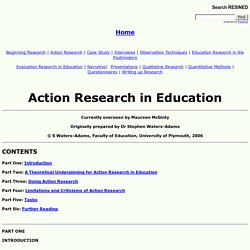
Triangulating Your Evidence. Triangulation: multiple forms of overlapping, diverse pieces of evidence and perspectives.
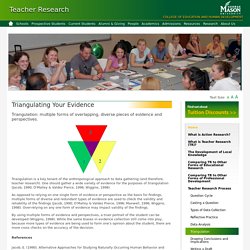
Triangulation is a key tenant of the anthropological approach to data gathering (and therefore, teacher research). One should gather a wide variety of evidence for the purposes of triangulation (Jacob, 1990; O'Malley & Valdez Pierce, 1996; Wiggins, 1998). As opposed to relying on one single form of evidence or perspective as the basis for findings, multiple forms of diverse and redundant types of evidence are used to check the validity and reliability of the findings (Jacob, 1990; O'Malley & Valdez Pierce, 1996; Maxwell, 1996; Wiggins, 1998). Over-relying on any one form of evidence may impact validity of the findings. By using multiple forms of evidence and perspectives, a truer portrait of the student can be developed (Wiggins, 1998).
References Jacob, E. (1990). Maxwell, J. (1996). O'Malley, J.M. & Valdez Pierce, L. (1996). Wiggins, G. (1998). Educational Researcher. Triangulation in Educational Research. ActionResearch - Research Topics. Ccar.wikispaces. Center for Collaborative Action Research. Sheffield Hallam University. Action Research (BECTa 2003) 1 How to use this timesaver Introduction The purpose of this timesaver is to provide a basic framework for reflection on classroom practice, and especially to enable you to study the impact of ICT on teaching and learning.

The timesaver is intended to support teachers at the planning stages of action research in the classroom. Action Research in Education. How to Do Action Research in Your Classroom. Action Research @ actionresearch.net. Jean McNiff - AR Booklet. Concise advice for new action researchers Jean McNiff First and Second Editions © Jean McNiff 1995, 1997 Third edition © Jean McNiff 2002Click here to download in Word Format (100 KB) This abridged version of the booklet is also available in a more expanded book form, from www.september-books.com – please see the weblink in the 'What's new' box on the home page.
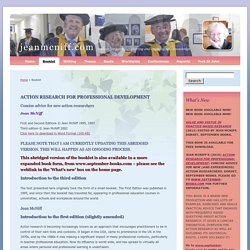
Introduction to the third edition The text presented here originally took the form of a small booklet. Jean McNiff Introduction to the first edition (slightly amended) Action research is becoming increasingly known as an approach that encourages practitioners to be in control of their own lives and contexts. This text aims to provide some general answers for the many people who ask, ‘What exactly is action research?’ Kurt Lewin: groups, experiential learning and action research. Contents: introduction · life · field theory · group dynamics · democracy and groups · t-groups, facilitation and experience · action research · conclusion · further reading and references · links. see, also : the groupwork pioneers series Kurt Lewin’s (1890-1947) work had a profound impact on social psychology and, more particularly for our purposes here, on our appreciation of experiential learning, group dynamics and action research.
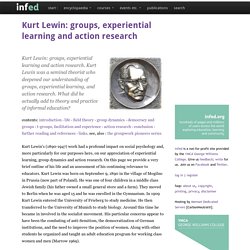
On this page we provide a very brief outline of his life and an assessment of his continuing relevance to educators. Kurt Lewin was born on September 9, 1890 in the village of Mogilno in Prussia (now part of Poland). He was one of four children in a middle class Jewish family (his father owned a small general store and a farm). They moved to Berlin when he was aged 15 and he was enrolled in the Gymnasium. The University of Iowa remained Kurt Lewin’s base until 1944. Field theory. Action research. Contents: introduction · origins · the decline and rediscovery of action research · conclusion · further reading · how to cite this article. see, also: research for practice.

In the literature, discussion of action research tends to fall into two distinctive camps. The British tradition – especially that linked to education – tends to view action research as research oriented toward the enhancement of direct practice. For example, Carr and Kemmis provide a classic definition: Action Research in Education.